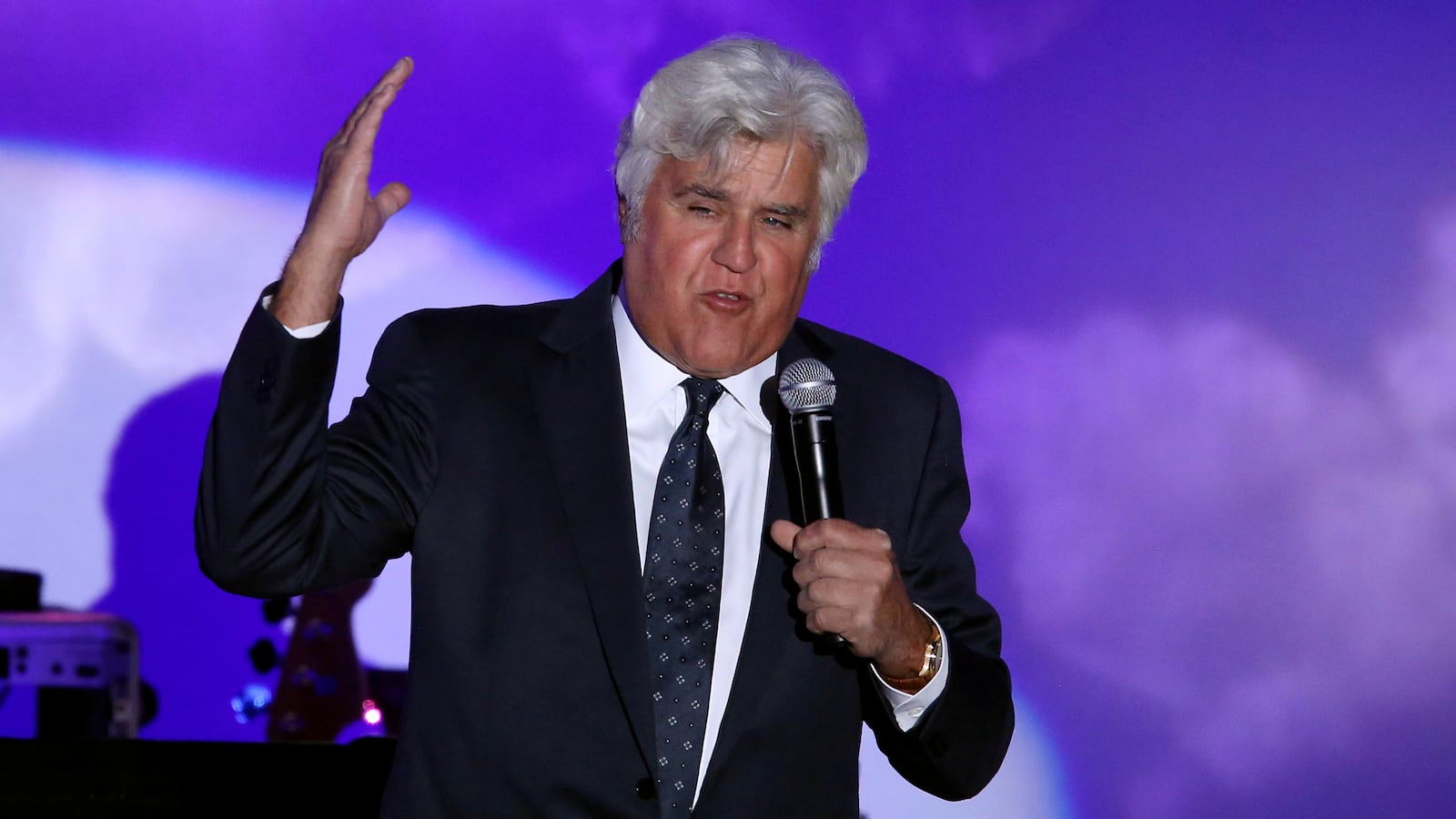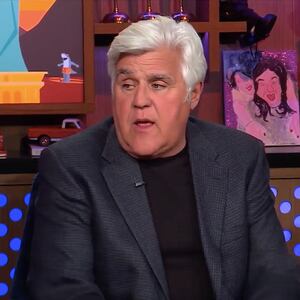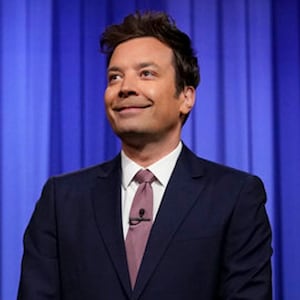On Tuesday, Jay Leno went viral with a sweet gesture: Just as he did in 2007, the comedian and former Tonight Show host handed out donuts to striking writers in a public act of solidarity. Although most online onlookers responded positively to the move, a couple of others called out what they saw as hypocrisy.
Members of the Writers Guild of America recently went on strike as studios refused to meet their demand for more livable wages, among other protections. During the union’s last strike in 2007, just like this week, Leno showed his support for the writers with sweet treats. After the moment went viral, however, a former writer from Leno’s two-season comedy game show You Bet Your Life with Jay Leno alleged that the show owes union workers “millions” in unpaid residuals.
“That’s really nice!” tweeted writer Dicky Eagan. “But you know what would be even better than $30 worth of donuts? If @jayleno helped track down the millions of dollars in residuals his show @youbetyourlife owes his @wga and other union workers.” Then, in response to a WGA captain who publicly thanked Leno for his support, Eagan added, “Pulling up in a $100,000 car to pass out $30 worth of donuts after refusing to pay writers millions in residuals isn't @WGAWest solidarity.”
Neither Eagan nor a representative for Leno responded to The Daily Beast’s request for comment.
Meanwhile, More Perfect Union reporter and producer Jordan Zakarin pointed out on Twitter that back in 2008, Leno found himself in hot water with the WGA for choosing to write his own monologues during the strike.
The 2007-2008 writers strike lasted 100 days and ended in the writers’ favor. In his book The War for Late Night, reporter and author Bill Carter wrote that at the outset of the 2000’s strike, “top network executives, sensing one way to undermine the solidarity of the union and its supporters among actors, directors, and other Hollywood guilds, almost immediately pushed for the late-night hosts to return to work. They argued that the hosts could mount shows without the writers.”
Initially, Carter reports in his book, most of the hosts had agreed that if they did come back with new episodes, they would do so as a group. Eventually, however, Carter writes that David Letterman chose to use his unique position as the owner of his production company to his advantage. In December 2007, word leaked that Letterman’s company had struck an independent agreement to bring his series and Craig Ferguson’s Late Late Show back on air with writers.
From there, everyone scrambled to get back on air. Multiple late night hosts who were also WGA members—including Leno, Stephen Colbert, Jon Stewart, and Jimmy Kimmel—wound up resuming production on their shows (without writers) before the strike had ended. According to a Variety report from the time, the move was “controversial among some in the scribe tribe.”
But Leno appears to have drawn more controversy during this time than anyone else. In the fall of 2007, Reuters reported that “some 80” stunned Tonight Show workers had been fired after Leno had allegedly convinced them that their jobs were safe.
“He was on speaker phone,” a source told Reuters at the time. “There were 80 of us. He told us not to panic. He said to trust him. He said: ‘I can’t get into details, but nobody will miss a car payment or lose their house. We’re family. Trust me. I’m going to take care of this.’ But that was the time we should have been looking for new jobs.”
A day after news broke of the mass firings came reports that Leno, too, had decided to pay non-writing workers out of pocket. Still, one staffer told Reuters, “A lot of people don’t want to work for Jay anymore… His true colors have shown.”
NBC declined to comment on the firings, Reuters reported, beyond a statement indicating that the company had “regretfully informed the people who work on ‘The Tonight Show With Jay Leno’ and ‘Late Night With Conan O’Brien’ that their services are not needed at this time due to our inability to continue production of the shows.”
Leno’s first episode back came in January 2008, when he welcomed Republican presidential candidate Mike Huckabee as a guest. Carter reports in his book that Kimmel avoided performing a monologue during his return episode, for fear of crossing a line. Leno, however, reportedly decided that The Tonight Show wouldn’t be The Tonight Show without a monologue.
“You know what I’m doing?” Leno said as he opened the show. “I’m doing what I did the day I started. I write jokes and wake my wife up in the middle of the night and say, ‘Honey, is this funny?’ So if this monologue doesn’t work it’s my wife’s fault. She says the joke was funny.”
“We are not using outside guys,” Leno continued, per a Variety report from that time. “We are following the guild thing. We can write for ourselves. We just can’t do what CBS did. See, Dave was able to get a deal because Dave has his own company. I don’t blame him for getting a deal, God bless him. We have to go by ourselves up against the CBS machine. One man against a monologue.”
Leno appears to have been the only host who wound up facing the WGA’s trial committee in 2008. By writing his own material, guild leaders alleged that he’d violated union rules barring members from performing “struck work,” per the Los Angeles Times.
Both the Tonight Show host and NBC argued at the time that as a performer, Leno was exempt from the rule.” WGA leadership countered that the exemption did not apply to performers who were also writers. In 2009, the guild cleared Leno.
Years later, in 2014, Leno would express pride during his final Tonight Show episode that it was a “union show.”
“I have never worked with a more professional group of people in my life,” Leno said. “They get paid good money and they do a good job.”
He added: “When the guys and women on this show would show me the new car they bought or the house up the street here in Burbank that one of the guys got, I felt I played a bigger role in their success as they played in mine. That was just a great feeling.”
Leno is just one of many public figures to voice their support for this year’s writers strike, alongside Bernie Sanders, Amanda Seyfried, Snoop Dogg, Mark Hamill, and Seth Meyers. On Tuesday, writer and comedian (and WGA member) Adam Conover pointed out during a CNN interview that Warner Bros. Discovery CEO David Zaslav’s $250 million salary is roughly equivalent to “what 10,000 writers are asking him to pay all of us collectively.”
Unless studios budge, we’re guessing those picket lines are going to need a lot more donuts.







